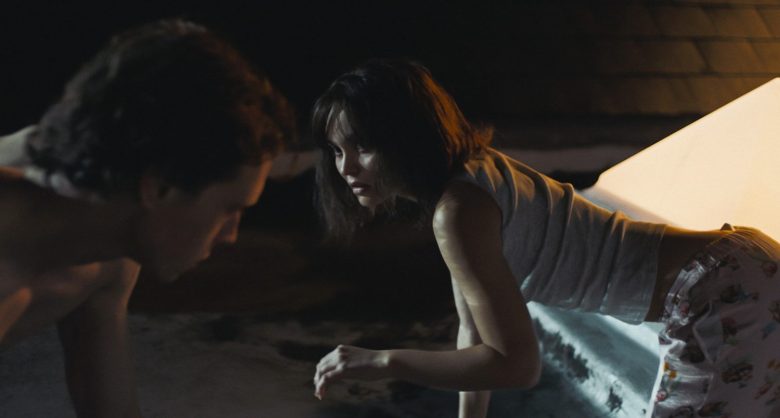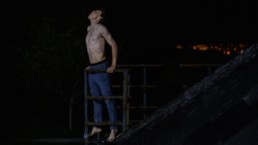In ‘Wolf,’ George MacKay and Lily-Rose Depp Embrace Their Animal Sides
"Species dysphoria" is the basis of Nathalie Biancheri's high concept arthouse film.
I love my family’s pug, Papacito. His rolls of back fat, droopy lips, and sensational snoring are what make him (and all pugs, really) so lovable. The thought of being a pug though is absolutely horrifying.
For some people, this is more than just a humorous “what if.” Clinical lycanthropy is a real mental disorder in which a person believes that they were born into the wrong body and are, in their truest form, a nonhuman animal. These delusions are not new either. The first major case dates back to the 1850s when a man truly believed he was a werewolf. This fascinating taboo of “species dysphoria” is the basis of Nathalie Biancheri’s high concept arthouse film Wolf.
George MacKay (1917) plays Jacob, a quiet young man who enters a facility that claims to cure a very specific psychosis: species dysphoria, or his belief that he is a wolf. Having gotten in trouble for acting on his animalistic instincts, Jacob and his fellow animal peers undergo intense and often graphic treatments at the hands of a man called The Zookeeper (Paddy Considine).
During his time at the clinic, Jacob befriends a Panda (Karise Yansen), steers clear of the Parrott (Lola Petticrew), is followed by the German Shepard (Fionn O’Shea), and unexpectedly, falls in love with the Wildcat, played by Lily-Rose Depp (The King). Her feline features compliment Jacob’s canine characteristics, and the two are quick to fall in puppy love. However, Jacob soon realizes that he is faced with a life-changing decision: can he deny his “true self” for true love?

It’s easy to quickly draw comparisons to Yorgos Lanthimos’ The Lobster (in my opinion one of the best movies ever made). But the similarities stop short of being a carbon copy of the Greek weird wave output. Wolf is a gritty juxtaposition between the beauty and complexity of staying true to oneself.
Despite the humorous thought of actors crawling on the floor and howling like animals for the majority of the film, Wolf is definitely not a comedy. The Zookeeper forces a young man who thinks he’s a Squirrel to climb up a tree using his fingernails which, as one could assume, ends in excruciating pain. He also pressures the girl who believes she’s a Parrot to jump from the window of their building, claiming that if she’s a real bird, she will be fine in her ascension.
Psychological torture and manipulation run rampant throughout the film, further illustrating that the idea of conversion therapy treatment centers are often fraught with abuse and power struggles. Further supporting the dark nature of the film is the primal score by Polish composer Stefan Wesolowsky, whose use of cellos, old synthesizers, flute, contrabass saxophone, and more create an edgy, untamed vibe.
George MacKay is the true star here, fully committing physically and emotionally to the role. His ability to stabilize and strengthen every scene he’s in is a true talent, and he shines the brightest on screen.
Giving the audience much to ponder post-watch, Wolf is a high concept, humble production that, at its core, is a film that celebrates the beauty of individuality.
Distributed by Focus Features. ‘Wolf’ opens in theaters this Friday.
Morgan Rojas
Certified fresh. For disclosure purposes, Morgan currently runs PR at PRETTYBIRD and Ventureland.

